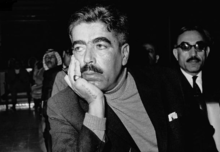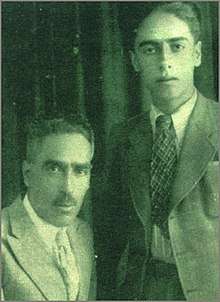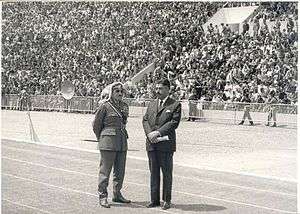Wasfi Tal
Wasfi Tal (Arabic: وصفي التل; 19 January 1919 – 28 November 1971) was a Jordanian politician, statesman and general. He served as Prime Minister of Jordan for three separate terms, 1962–63, 1965–67 and 1970 until his assassination in 1971.
Wasfi Tal | |
|---|---|
وصفي التل | |
 Wasfi Tal in 1962 | |
| 15th Prime Minister of Jordan | |
| In office 28 January 1962 – 27 March 1963 | |
| Monarch | Hussein |
| Preceded by | Bahjat Talhouni |
| Succeeded by | Samir Al-Rifai |
| In office 14 February 1965 – 4 March 1967 | |
| Monarch | Hussein |
| Preceded by | Bahjat Talhouni |
| Succeeded by | Hussein ibn Nasser |
| In office 28 October 1970 – 28 November 1971 | |
| Monarch | Hussein |
| Preceded by | Ahmad Toukan |
| Succeeded by | Ahmad Lozi |
| Personal details | |
| Born | January 19, 1919 Arapgir, Turkey |
| Died | 28 November 1971 (aged 52) Cairo, Egypt |
| Spouse(s) | Saida Al Jabari |
| Alma mater | American University of Beirut |
| Occupation | Military Officer, Diplomat |
| Profession | Natural Sciences |
Tal was born in Turkey to prominent poet Mustafa Wahbi Tal. He moved to Jordan at 5 years old. He received his education in Al-Salt, later continuing his education at the American University of Beirut in 1941. He then joined the British Army in Mandatory Palestine after being trained in a British-run military academy, and joined the irregular Arab Liberation Army to fight against Israel during the 1948 Arab–Israeli War.[1]
Following the war, he served various positions in the Jordanian government, rising to higher positions after his abilities captured King Hussein's attention. His first tenure as Prime Minister in 1962 was short-lived, he resigned in 1963 over widespread criticism of his perceived pro-Western views.[2] He was appointed Prime Minister again in 1965, which saw an improved climate of economic activity, but resigned just before the onset of the Six Day War in 1967. He was appointed again as Prime Minister in 1970 during Black September, the conflict which saw Palestine Liberation Organization fighters (fedayeen) expelled from Jordan. Earning the ire of PLO leaders for his role in the conflict, he was assassinated by the Black September group outside a Cairo hotel hosting an Arab League conference.[3]
Tal was reportedly extremely loyal to King Hussein, and was popular within Jordan for his success in expelling the fedayeen. Meanwhile, he was widely denounced by Arabs who had supported the fedayeen. Egyptian President Anwar Sadat had also despised Tal.[4] Tal was the third senior Jordanian political figure assassinated between 1951 and 1971; the first two being King Abdullah I and Prime Minister Hazza Majali. His assassins were found innocent and released on bail by an Egyptian court.[5]
Early life and career

Tal was born in Arapgir to prominent poet Mustafa Wahbi Tal and Kurdish mother Munifa Baban. His family relocated to Irbid when he was five. He moved to Al-Salt in 1936 when he was 16 to go to the only public high school in Jordan at the time. As a student he founded a secret student organization called the "Black Hand" whose goal was to promote a more aggressive stance against Zionism. During his time as a student he and several students in the "black hand" were arrested after bombing Al-Salt mayor's mansion. Due to his family influence and the fact no one was hurt in the bombing he was released a few days later and allowed to finish his education. Later continuing his education at the American University of Beirut in 1941.
He then joined the British Army in Mandatory Palestine after being trained in a British-run military academy, and joined the irregular Arab Liberation Army to fight against Israel during the 1948 Arab–Israeli War. Due to his experience in the British army he started off with the rank of Captain. After the Arab Liberation Army was dissolved in 1948 his unit was reassigned to the Syrian army for the remainder of the war under the new name Yarmuk Forces. By May 1949 he had risen to the rank of major.[6]
Following the war, he served various positions in the Jordanian government, rising to higher positions after his abilities captured King Hussein's attention. His first tenure as Prime Minister in 1962 was short-lived, he resigned in 1963 over widespread criticism of his perceived pro-Western views. He was appointed Prime Minister again in 1965, which saw an improved climate of economic activity, but resigned just before the onset of the Six Day War in 1967. He was appointed again as Prime Minister in 1970 during Black September, the conflict which saw Palestine Liberation Organization fighters (fedayeen) expelled from Jordan. Earning the ire of PLO leaders for his role in the conflict, he was assassinated by the Black September group outside a Cairo hotel hosting an Arab League conference.
Assassination

On 28 November 1971, four Black September gunmen assassinated Tal in the lobby of the Sheraton Cairo Hotel in Egypt while he was attending an Arab League summit in the city.[7][8] Among other acts, Black September accused Tal of personally torturing and executing Abu Ali Iyad, a Fatah field commander whose partisans formed the backbone of the Black September organization.[9] Historian Patrick Seale claims that one of the assassins, Munshir al-Khalifa, was one of Abu Ali Iyad's soldiers who sought to avenge his commander's death.[9][10] As Tal lay dying, "one of the assassins knelt and lapped with his tongue the blood flowing across the marble floor."[11][12]
Tal was the first victim of the newly formed Black September Organization, a more militant offshoot of the Palestinian militant organization Fatah. His assassins were released on low bail and allowed to leave Egypt. Yasser Arafat, Fatah's leader, claimed responsibility for the killing.[7]
Tal was reportedly extremely loyal to King Hussein, and was popular within Jordan for his success in expelling the fedayeen. Meanwhile, he was widely denounced by Arabs who had supported the fedayeen. Egyptian President Anwar Sadat had also despised Tal. Tal was the third senior Jordanian political figure assassinated between 1951 and 1971; the first two being King Abdullah I and Prime Minister Hazza Majali. His assassins were found innocent and released on bail by an Egyptian court.
Burial
Tal's body was flown back to Amman on 28 November 1971. He was buried in the royal cemetery after the prayers in the Royal Mosque in Amman on 29 November.[13]
Personal life
Tal was married to Sadia Jabri, who had been former wife of the Palestinian leader of the 1940s, Musa Alami. They had no children.[14]
Honour
Foreign honour

See also
- List of Prime Ministers of Jordan
- Palestinian political violence
- Mustafa Wahbi Tal
- Abdullah Tal
References
- "Hussein's Premier". The New York Times. 7 April 1971. Retrieved 28 November 2018.
- Heads of States and Governments Since 1945. Retrieved 29 November 2018.
- Fallible Memory, Benny Morris
- "Slain Jordanian Angered Many Arabs". The New York Times. 29 November 1971. Retrieved 29 November 2018.
- Grose, Peter (29 November 1971). "Bloody reprisals feared for slaying of premier". Eugene Register-Guard. Ramallah. Retrieved 15 December 2012.
- Susser, A. (2017). On both banks of the Jordan: a political biography of Wasfi al-Tall (Vol. 2). Routledge.
- Rubin, Barry M. (1994). Revolution until victory?: the politics and history of the PLO. pp. 37–38.
- Jessup, John E. (1998). An encyclopedic dictionary of conflict and conflict resolution, 1945–1996. p. 77.
- Amos, 1980, p.222.
- Seale, 1982, p.81.
- Bruce Hoffman (December 2001). "All you need is love: How the terrorists stopped terrorism". The Atlantic.
- Shair, Kamal A. (2006). Out of the Middle East: the emergence of an Arab global business. p. 240.
- "Avange Rebel's Death". The Deseret News. Caito. UPI. 29 November 1971. Retrieved 15 December 2012.
- "Wasfi Tel was bitter enemy of guerrillas". Gadsden Times. 29 November 1971. Retrieved 15 December 2012.
- "Senarai Penuh Penerima Darjah Kebesaran, Bintang dan Pingat Persekutuan Tahun 1965" (PDF).
Bibliography
- Amos, John (1980). Palestinian resistance: organization of a nationalist movement. Pergamon Press. ISBN 0-08-025094-7.
- Seale, Patrick (1992). Abu Nidal: a gun for hire. Random House. ISBN 0-679-40066-4.
- Susser, Asher (1994). On both banks of the Jordan : a political biography of Wasfi al-Tall. Frank Cass. ISBN 0714645281.
| Political offices | ||
|---|---|---|
| Preceded by Bahjat Talhouni |
Prime Minister of Jordan 1962–1963 |
Succeeded by Samir al-Rifai |
| Preceded by Bahjat Talhouni |
Prime Minister of Jordan 1965–1967 |
Succeeded by Hussein ibn Nasser |
| Preceded by Ahmad Toukan |
Prime Minister of Jordan 1970–1971 |
Succeeded by Ahmad al-Lawzi |